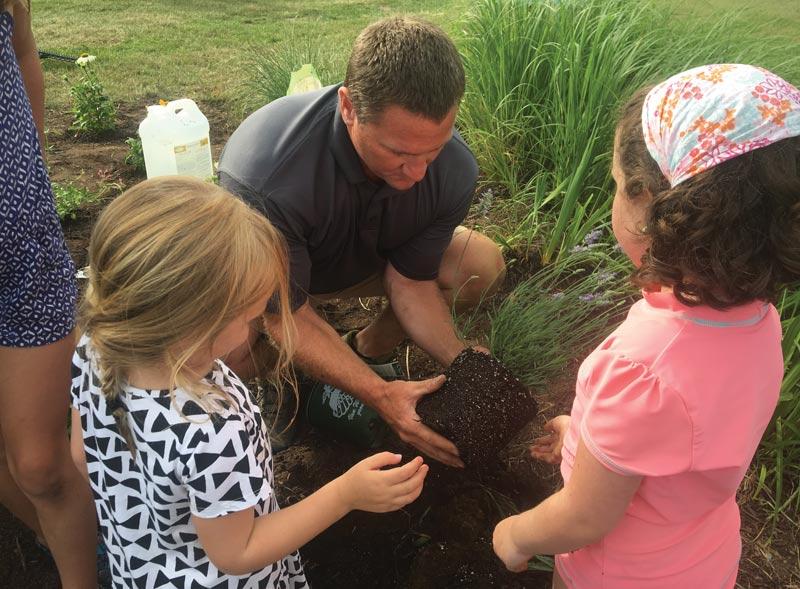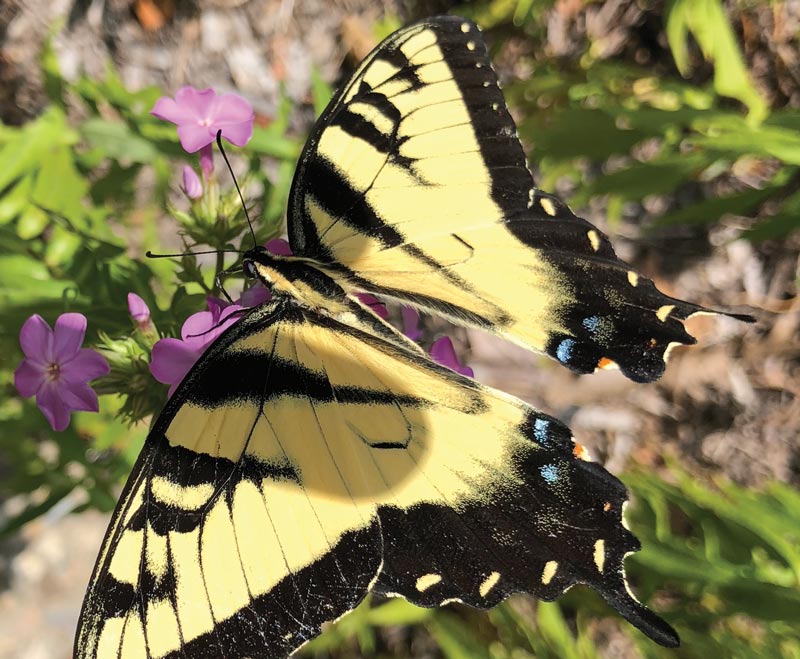
Creating a buzz: GCSAA Class A superintendent Peter Gorman (center) works with youngsters to plant a pollinator garden during a children’s workshop at Pine Orchard Yacht & Country Club in Branford, Conn. Photo courtesy of Peter Gorman
Pollinators have been a hot topic in the media and across social media outlets in recent years. While most of the reports and conversations focus on the role of pesticides in the demise of native pollinators, the focus throughout the golf industry has been on finding ways to create and expand high-value pollinator habitat on golf courses and within communities.
Quite often, golf course superintendents find themselves in debates where they must counter emotion-based arguments using science to defend their programs and profession. The time has come to take control of the message by championing the environmental benefits of golf courses, and, more importantly, to tout the role of superintendents as professionals and stewards of the environment.
Golf course superintendents can engage golfers and their families by hosting a children’s pollinator workshop. Such workshops introduce a new generation to the golf course, offer a unique educational experience, and open up valuable avenues for direct communication and interaction with members and the general public. These events also present opportunities to generate business at the restaurant or promote your course in the local media.
Sample timeline for a pollinator workshop
Children of all ages along with their parents and grandparents are invited to participate in the workshop, which includes three main stages:
Introduction. The overall theme is introduced, followed by descriptions of the key components of the workshop.
Arts and crafts. During this portion of the workshop, the children color pictures of bees and butterflies that depict the ideas introduced during an expanded discussion of the overall theme.
Garden planting. Parents and older children are invited to help younger children plant high-value native perennials to create a pollinator garden.
Sample themes for a pollinator workshop
Bee Aware: Educate yourself about pollinator life cycles and habitat
- What are pollinators and why are they important?
- Become familiar with the various native pollinators in your region and what they require to thrive.
- Discover opportunities to establish or improve pollinator habitat on the golf course.
- Share a list of resources that can help families learn more and that build on the lessons covered during the workshop.
Bee Healthy: What elements support pollinators during each stage of their life cycle?
- Plant clusters of native plants that support all stages of development for a variety of beneficial insects.
- Install a hummingbird feeder as an alternate source of nectar.
- Create a mud spot or salt lick to supply essential nutrients.
Bee Kind: Identify ways to improve the value of your property and minimize impact on pollinators, and identify ways to help pollinators thrive throughout the community
- Plant a pollinator garden or incorporate pollinator-friendly plants into the landscape.
- Add interest to a pollinator garden by adding food or nesting sites for native bees, butterflies and other beneficial insects.
- Develop responsible landscape management programs that are based on maintaining healthy plants and reducing reliance on pest control products.
The take-home message
A pollinator workshop allows superintendents to connect with current and potential golfers and to promote themselves, their programs and their role as responsible managers of high-value landscapes. Delivering a positive, informed message in an educational, recreational and social setting creates the opportunity for a relaxed dialogue to evolve, which further develops the image of the superintendent as a knowledgeable, engaged professional.

A tiger swallowtail butterfly. Children’s pollinator workshops led by superintendents welcome young minds into the worlds of both pollinators and golf courses. Photo by Andrew Hartsock
While the garden is being installed, staff or volunteers scan the coloring pages, print them onto iron-on paper and make T-shirts, which will be returned to the individual artists at the end of the workshop. Develop a handout that includes links to educational resources, extension contacts and programs, and ideas for how participants can cultivate and improve pollinator habitats at their homes.
The T-shirts and the garden itself will serve as subtle reminders of the event and its message. Participants and parents will also remember the professionals who shared their time and knowledge.
Tips for getting started
Start small. Confusion and chaos can undermine the whole event. Make sure you choose a location that is easy to find, provides space for the arts and crafts, and keeps the flow between activities manageable. It’s better to have kids help each other plant the garden than to have more plants than helpers. It also keeps cleanup and maintenance to a minimum.
Be visible. Pick a location that participants will be able to see often or can access easily so they can show family members and friends the flowers they planted and check for pollinators visiting their garden. Make a small sign to identify the garden.
Practice. Designate a staff member or volunteer as the leader for each stage of the workshop and do a run-through or two. Iron out any wrinkles beforehand by laying out the plants and practicing the T-shirt production.
Be flexible. Focus on the kids’ experience and creating a lasting memory. The educational value may be realized later, when the youngsters cover the topic in school and can tell their class that they learned about pollinators at a golf course.
Peter Gorman, GCSAA Class A superintendent and a 20-year member of the association, is the vice president of the Connecticut Association of Golf Course Superintendents and has established a reputation as an advocate for superintendents and the golf industry in Connecticut. He participates in GCSAA’s Grassroots Ambassador program, represented golf on the science and technical workgroup for the Connecticut State Water Plan, serves as steering committee chair for the Connecticut and New England regional BMP projects, and is a member of the University of Connecticut dean’s advisory board for the College of Agriculture, Health and Natural Resources. He recently left his position as superintendent at Pine Orchard Yacht & Country Club in Branford, Conn., to become a technical representative at Atlantic Golf & Turf in Turners Falls, Mass.